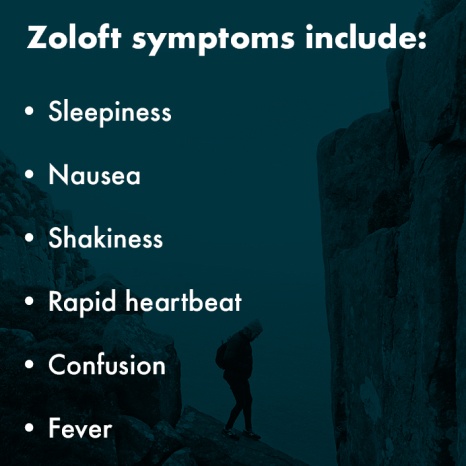Zoloft and Alcohol
WHAT IS ZOLOFT?
IS ZOLOFT ADDICTIVE?

However, it should be noted that Zoloft can produce side-effects, as well as withdrawal symptoms if discontinued too quickly. As far as side-effects, the most common include: Nausea, dizziness, drowsiness, dry mouth, loss of appetite, increased sweating, diarrhea, upset stomach, and trouble sleeping.
MountainView Recovery
5475 Mark Dabling Blvd #102
Colorado Springs, Co 80918
Contact Us Today!
MountainView Resources!
CAN YOU OVERDOSE ON ZOLOFT?
Because Zoloft is not a narcotic, or addictive drug, it is rare that persons will overdose on Zoloft alone. One can take too much, and there are common symptoms that occur if an individual decides to take more than their prescribed amount. Some symptoms include:
- Sleepiness
- Nausea
- Shakiness
- Rapid heartbeat
- Confusion
- Fever

There are also some less common, but more severe, symptoms of an overdose, such as:
- Fainting
- Heart problems
- Seizures
- Delirium
- Hallucinations
- Stupor
Again, this is not overly common, as individuals do not tend to feel “high” when ingesting more than prescribed amounts of Zoloft. However, when combined with alcohol, Zoloft can become very dangerous, very quickly.
ZOLOFT AND ALCOHOL COMBINED
As we have already established, Zoloft is considered an SSRI (selective serotonin reuptake inhibitor). It affects the way our brains process serotonin, one of the “pleasure chemicals”. Used properly as an antidepressant, this prescription drug can be extremely effective for those struggling with depression. Alcohol, on the other hand, is a depressant. This means that alcohol depresses, or dampens, the central nervous system. While the exact effects of combining these two substances are not crystal clear, healthcare professionals consistently maintain that drinking alcohol while taking an antidepressant is unwise.

Consider this: a depressant will typically counteract an antidepressant; makes sense, right? In fact, drinking alcohol can actually make depression symptoms worse than they were before an individual started taking Zoloft. There is also the issue of Zoloft enhancing the effects of alcohol while drinking. People tend to feel intoxicated quicker when combining Zoloft with alcohol, and the dangers of doing so are myriad. As the central nervous system depresses, brain functioning slows, which can lead to complications such as respiratory failure, coma, and even death.
Clearly, Zoloft and alcohol can be a dangerous combination. Even when taking Zoloft alone, as prescribed, there are still risks and side-effects that can occur. Naturally, when you combine this with an intoxicating substance such as alcohol, it enhances the risks and side-effects. If you or a loved one is struggling with substance abuse, please contact us today. Our team has extensive experience with these issues, and specializes in polysubstance abuse. In fact, our telemed and telehealth services are here to help those who are not able to enter a treatment facility due to Covid-19. We are here for you!
Mountain View Recovery Treatment Programs
Patient Resources
Addiction is complex, which means treatment and long-term recovery are complex. Despite this, it shouldn’t scare anyone – patients or their loved ones. It just means that treatment and recovery both require thorough and thoughtful planning.
Outpatient Program
Our outpatient program (OP) is a transition preparatory phase. It provides a minimum of nine (9) hours of weekly outpatient treatment. This involves a minimum of one (1) hour/s individual substance abuse/behavioral health counseling per week.
Adventure Therapy
For a long time, nature has been seen as a balm to the problems we face in society. Even during pre-industrial times, people would seek out the countryside as a means to feel better. Many people have also used nature as a way to understand the world.
Trauma and Recovery
Just like physical trauma occurs, so does psychological trauma. Any number of traumatizing events occur and cause psychological trauma. A lot of people will experience trauma before or because of addiction. It’s possible for addiction to deepen…
Neurofeedback
Nobody sets out with the intention of becoming addicted to anything. Even someone making a conscious decision to try substances is not intending to become dependent, experience withdrawal, and risk overdose or death. There are numerous factors.
